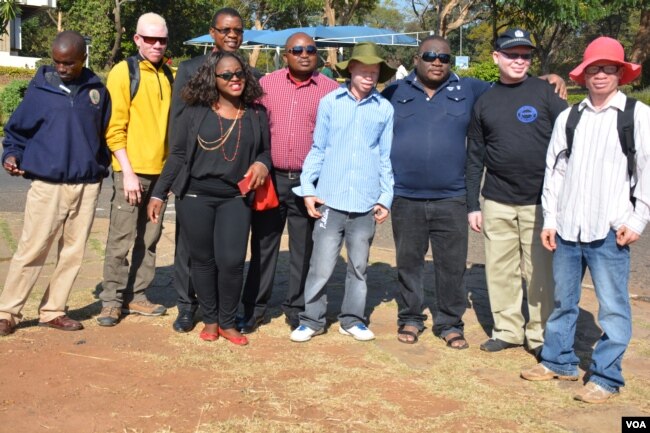Group Seeks New Approach to End Attacks on Albino’s for Body Parts
 |
| One thing is to Preach salvation, another is to give it to needy ones now. Kids affected by the man inhumanity to man. |
BLANTYRE, MALAWI —

Attacks on people with albinism are resurging in Malawi after a six-month lull last year, when the government and a local rights group campaigned to end the violence.
Albinos are targeted because of the false belief that their body parts have powers to increase wealth
Now an Albino welfare body is asking the government to institute a commission of inquiry to find where the body parts are sold.
Recent attacks
Malawians had a rude wakening in January when a 17-year-old albino boy was brutally killed in southern Malawi. The suspected attacker allegedly enticed the boy into his home with biscuits and juice.
Police have since arrested the suspect. But more attacks and attempted kidnappings have followed. In the most recent incident, police in the capital, Lilongwe, arrested one of two attackers who tried to force their way into the home of an albino rights activist last week.
The suspect is awaiting trial.
On Tuesday, police in the Mchinji district of central Malawi exhumed the bones of an albino person whose grave was vandalized. Two men were arrested last week after they were found selling some of the bones.

People with albinism pose with campaigners for their rights in the capital of Lilongwe,
Malawi, in early 2016 before the start of street protests against recent attacks.
Albinos are targeted because of the false belief that their body parts have powers
to increase wealth.
Market thriving
Overstone Kondowe is the president of the Association of People with Albinism in Malawi. He told VOA these incidents confirm the thriving market for albino body parts.
“We are asking for a new approach to undo this business,” Kondowe said. “That’s why we would love as an association if we would have this commission instituted as urgently as possible in order to reverse the trend.”
Police records show that 19 people with albinism have been killed since 2014, along with about 100 cases of abductions and attempted abductions.
The government previously put measures into effect to end the attacks, including imposing harsh penalties on those who seek to harm albinos. It also set up a task force to deal with crimes against albinos. Kondowe says the task force is not funded yet to carry out its duties.
“We are proposing a commission of inquiry because we have seen how effective it is and how free people are to give information whenever they have been invited, which can lead to the arrest of the masterminders of this business,” Kondowe said.
Working with Interpol
Nicolas Dausi is the government spokesperson. He told VOA that with or without the commission of inquiry, tracking down the masterminds of the albino attacks is not an easy task.
“There is a problem because the people who are doing this they are the relatives, like an uncle; a father can sell his daughter or son with albinism,” Dausi said.
However, he says the government is working with Interpol.
“The police is liaising with counterparts in the SADC [Southern African Development Community] region through Interpol because it started, you remember, in Tanzania and then Mozambique,” Dausi said. “And through Interpol we are hope to get to the core to as where are the market.”
Mia Seppo is the country representative of the United Nations Development Program in Malawi.
“We are very concerned,” Seppo said. “And we are having discussions with partners on what to be done to ensure that it’s just a temporary situation.”
Last year, a visiting U.N. representative said an estimated 10,000 albinos face death in Malawi if the government fails to end these attacks.
Comments